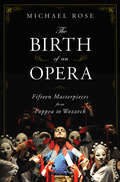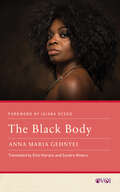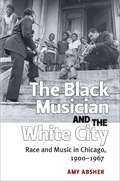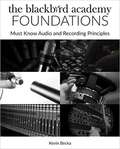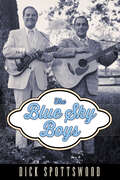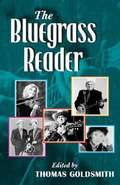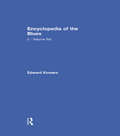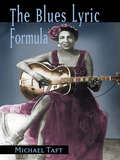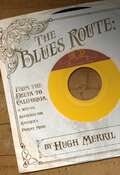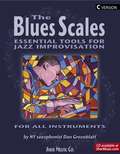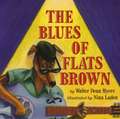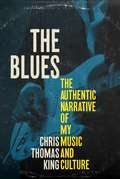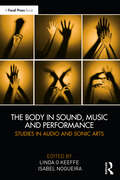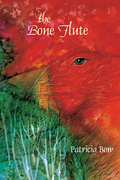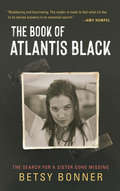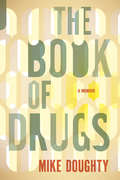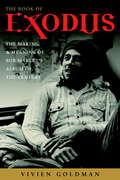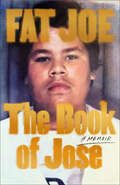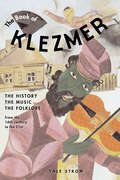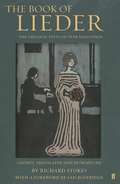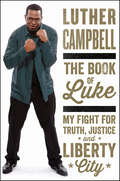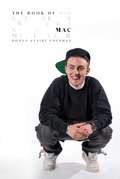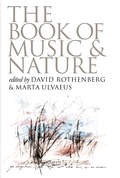- Table View
- List View
The Birth of an Opera: Fifteen Masterpieces from Poppea to Wozzeck
by Michael RoseThe Birth of an Opera offers illuminating insight into how operas are written and the personalities, incidents, and musical circumstances that have shaped their composition. Through a deft compilation of primary sources--letters, memoirs, and personal accounts from composers, librettists, and performers--Michael Rose re-creates for his readers the circumstances that gave rise to fifteen operatic milestones. From Monteverdi and Mozart to Puccini and Berg, each chapter focuses on a well-known opera and tells the story that lies behind its creation. Rather than retreading familiar ground with pages of historical and musical analysis, Rose places each opera firmly in the context of the composer's life and provides an engaging text in which the varied and colorful personalities involved are seen to discuss, comment, and contribute in one way or another to the progress of its composition. The reader will find Mozart with a new and flamboyant librettist tackling the risky enterprise of Le Nozze di Figaro; Wagner confessing his hidden love for the woman who inspires him as he creates the passionate drama of Tristan und Isolde; Verdi deep in Shakespearian discussion with Boito as they remodel the tragedy of Otello; and Debussy coming almost literally to blows with Maeterlinck over the soprano to take the leading role in Pelléas et Mélisande. Throughout, Rose offers his readers the most direct possible link to events that have often become twisted or obscured by operatic myth, and in so doing he captures the bizarre interactions of chance, genius, practical necessity, and dogged determination that accompanied the making of some of opera's most enduring masterpieces.
The Black Body (Other Voices of Italy)
by Anna Maria GehnyeiIn her memoir, Anna Maria Gehnyei, better known as singer, rapper, and producer Karima 2G, reveals the challenges she faced as the child of Liberian immigrants, born and raised in Rome but perpetually viewed by her fellow Italians as a foreigner. The daughter of the first Kpelle man to ever leave his native village and emigrate to Europe, Anna is proud of her heritage but only knows Liberia as a mystical, faraway land that appears in her parents’ stories. Though Italy is the only homeland she knows, she is merely classed as a resident, not a permanent citizen. At school and in the streets of Rome, she is treated to a mixture of patronizing condescension and xenophobic hostility. But Anna refuses to be bullied into mute submission, finding her voice as a performer and activist who demands recognition for Italy’s growing immigrant population.
The Black Musician And The White City: Race And Music In Chicago, 1900-1967
by Amy AbsherAmy Absher’s The Black Musician and the White City tells the story of African American musicians in Chicago during the mid-twentieth century. While depicting the segregated city before World War II, Absher traces the migration of black musicians, both men and women and both classical and vernacular performers, from the American South to Chicago during the 1930s to 1950s. Absher’s work diverges from existing studies in three ways: First, she takes the history beyond the study of jazz and blues by examining the significant role that classically trained black musicians played in building the Chicago South Side community. By acknowledging the presence and importance of classical musicians, Absher argues that black migrants in Chicago had diverse education and economic backgrounds but found common cause in the city’s music community. Second, Absher brings numerous maps to the history, illustrating the relationship between Chicago’s physical lines of segregation and the geography of black music in the city over the years. Third, Absher’s use of archival sources is both extensive and original, drawing on manuscript and oral history collections at the Center for Black Music Research in Chicago, Columbia University, Rutgers’s Institute of Jazz Studies, and Tulane’s Hogan Jazz Archive. By approaching the Chicago black musical community from these previously untapped angles, Absher offers a history that goes beyond the retelling of the achievements of the famous musicians by discussing musicians as a group. In The Black Musician and the White City, black musicians are the leading actors, thinkers, organizers, and critics of their own story.
The Blackbird Academy Foundations: Must-know Audio And Recording Principles
by Kevin Becka Blackbird AcademyThe Blackbird Academy Foundations: Must-Know Audio and Recording Principles is designed to build your music engineering and audio production skills. The principles are directed at beginners to more advanced music creators, remixers, musicians, songwriters, singers, and those curious about what it takes to record, overdub, and mix quality music. Those who aspire to music, from ages 10 and up, will gain operational skills and understanding of basic to advanced recording concepts including: • Signal flow • Microphone recognition and advanced placement • The keys to achieving great results when recording • Essential analog and digital gear used in audio production • Using a digital audio workstation • Understanding analog to digital, and digital to analog, conversion • Using plug-ins and analog processing when recording, overdubbing, and mixing • Developing software skills, such as tuning processing, editing, and mixing • Console basics and operation • Using auziliary tracks and buses • Using shortcuts to build speed • Learning how to listen • And much more! Those more advanced will also achieve benefits from reading what was written around the gear and workflow at Blackbird Studio, the world-renowned production facility located in Nashville, Tennessee. Blackbird has produced hundreds of hit records from a variety of artists, including Taylor Swift, Jack White, Martina McBride, The Black Keys, Kings of Leon, Keith Urban, Tim McGraw, and many more. Readers will learn an impressive range of valuable information only known in the inner circles of production at the heart of Music City USA.
The Blue Sky Boys (American Made Music Series)
by Dick SpottswoodDuring the 1940s, country music was rapidly evolving from traditional songs and string band styles to honky-tonk, western swing, and bluegrass, via radio, records, and film. The Blue Sky Boys, brothers Bill (1917-2008) and Earl (1919-1998) Bolick, resisted the trend, preferring to perform folk and parlor songs, southern hymns, and new compositions that enhanced their trademark intimacy and warmth. They were still in their teens when they became professional musicians to avoid laboring in Depression-era North Carolina cotton mills. Their instantly recognizable style was fully formed by 1936, when even their first records captured soulful harmonies accented with spare guitar and mandolin accompaniments. They inspired imitators, but none could duplicate the Blue Sky Boys' emotional appeal or their distinctive Catawba County accents. Even their last records in the 1970s retained their unique magical sound decades after other country brother duets had come and gone.In this absorbing account, Dick Spottswood combines excerpts from Bill Bolick's numerous spoken interviews and written accounts of his music, life, and career into a single narrative that presents much of the story in Bill's own voice. Spottswood reveals fascinating nuggets about broadcasting, recording, and surviving in the 1930s world of country music. He describes how the growing industry both aided and thwarted the Bolick brothers' career, and how World War II nearly finished it. The book features a complete, extensively annotated list of Blue Sky Boys songs, an updated discography that includes surviving unpublished records, and dozens of vintage photos and sheet music covers.
The Bluegrass Reader
by Thomas GoldsmithLike rock 'n' roll, bluegrass exploded out of a post-World War II atmosphere in which more Americans opened their ears to more different kinds of music than ever before. All around the country musicians were searching for new sounds and approaches: country blues went fully electric in Chicago, bebop boiled over as jazz hit the hippest notes yet, and country music followed Hank Williams into new, sexier, harder-hitting territory. The developments in bluegrass proved every bit as galvanic. In The Bluegrass Reader, Thomas Goldsmith joins his insights as a journalist with a lifetime of experience in bluegrass to capture the full story of this dynamic and beloved music. Inspired by the question, what articles about bluegrass would you want to have with you on a desert island? he has assembled a captivating, fun-to-read collection that brings together a wide range of the very best in bluegrass writing.
The Blues Encyclopedia
by Edward KomaraThe Blues Encyclopedia is the first full-length authoritative Encyclopedia on the Blues as a musical form. While other books have collected biographies of blues performers, none have taken a scholarly approach. A to Z in format, this Encyclopedia covers not only the performers, but also musical styles, regions, record labels and cultural aspects of the blues, including race and gender issues. Special attention is paid to discographies and bibliographies.
The Blues Lyric Formula
by Michael TaftThis book is the first rigourous and detailed exploration of exactly how blues singers used formulas to create songs, and it more than amply fills the gap in the the study of the blues, where the structure and content of the lyrics have been less fully explored than the musical form. Focusing on the songs recorded by African-American singers for pre-World War Two commercial recording companies, this is an excellent structural analysis of the formulaic composistion of blues lyrics. This book gives a step-by-step description of the rules implicit in this formulaic structure and inspires new discussion of lyric structures. A wide array of readers will find this insightful and informative: from students of African-American music, cultural studies, history and linguistics, to Blues fans fascinated by exactly how the lyrics of this influential music style are written.
The Blues Route: From the Delta to California, a writer searches for America's purest music
by Hugh MerrillJournalist Hugh Merrill takes us on a sweeping road trip in search of the distinctly American music known as the blues. Tracing blues culture from its beginning in rural Mississippi up through the Delta to Chicago and beyond, Merrill visits with legendary musicians such as Son Thomas, Koko Taylor, Son Seals, Valerie Wellington and Magic Slim. In fascinating interviews, Merrill uncovers wonderful stories about Robert Johnson, Big Bill Broonzy, Willie Dixon, Muddy Waters, Jelly Roll Morton, Bessie Smith, Ida Cox and Ma Rainey. The trip dips into New Orleans as Merrill explores how the blues exploded in clubs and cribs, influencing dixieland, jazz and zydeco. A trip out west presents a lovely tour of the cocktail lounges of Oakland and Los Angeles and the guardians of the blues who live there. The Blues Route is an engrossing narrative, a book that celebrates not only the music but the continuing search for sympathy, understanding and affinity that the blues embodies.
The Blues Scales - C Version
by Sher Music Dan GreenblattThe only book that shows how the Blues Scales (Major and Minor) are used to create jazz solos. Designed to help beginners quickly learn how to create meaningful solos without having to first master all the scales and chords of a tune. Great transcriptions of solo phrases by Miles Davis, Dave Sanborn, Dizzy Gillespie, etc. showing how the Blues Scales are used. The accompanying CD has the author and his NY rhythm section demonstrating each exercise, and also great as a jazz play-along! Endorsed by Michael Brecker, Jamey Aebersold, etc. The audio portion of this book is available for free download at http://www.shermusic.com/new/downloads.shtml.
The Blues Singers: Ten Who Rocked the World
by Julius LesterThe blues. It's that low-down feeling that makes you ache from your soul to the soles of your shoes. Here in the voice of a grandfather passing on a legacy to a younger generation, renowned author Julius Lester introduces ten of the hottest black blues singers of our time. The diva Aretha Franklin, the legendary Billie Holiday, and the fabulous B.B. King are just a taste of what's in store.
The Blues of Flats Brown
by Walter Dean MyersTo escape an abusive master, a junkyard dog named Flats runs away and makes a name for himself from Mississippi to New York City playing blues on his guitar.
The Blues: The Authentic Narrative of My Music and Culture
by Chris Thomas King"A fresh new perspective that will be a true revolution to readers and will open new lines of discussion on . . . the importance of the city of New Orleans for generations to come." —Dr. Michael White, jazz clarinetist, composer, and Keller Endowed Chair at Xavier University of LA An untold authentic counter-narrative blues history and the first written by an African American blues artist All prior histories on the blues have alleged it originated on plantations in the Mississippi Delta. Not true, says author Chris Thomas King. In The Blues, King present facts to disprove such myths. This book is the first to argue the blues began as a cosmopolitan art form, not a rural one. As early as 1900, the sound of the blues was ubiquitous in New Orleans. The Mississippi Delta, meanwhile, was an unpopulated sportsman's paradise—the frontier was still in the process of being cleared and drained for cultivation.? Expecting these findings to be controversial in some circles, King has buttressed his conclusions with primary sources and years of extensive research, including a sojourn to West Africa and interviews with surviving folklorists and blues researchers from the 1960s folk-rediscovery epoch.? New Orleans, King states, was the only place in the Deep South where the sacred and profane could party together without fear of persecution, creating the blues.
The Body in Sound, Music and Performance: Studies in Audio and Sonic Arts
by Linda O KeeffeThe Body in Sound, Music and Performance brings together cutting-edge contributions from women working on and researching contemporary sound practice. This highly interdisciplinary book features a host of international contributors and places emphasis on developments beyond the western world, including movements growing across Latin America. Within the book, the body is situated as both the site and centre for knowledge making and creative production. Chapters explore how insightful theoretical analysis, new methods, innovative practises, and sometimes within the socio-cultural conditions of racism, sexism and classicism, the body can rise above, reshape and deconstruct understood ideas about performance practices, composition, and listening/sensing. This book will be of interest to both practitioners and researchers in the fields of sonic arts, sound design, music, acoustics and performance.
The Bone Flute
by Patricia BowCamrose, a perfectly normal 12-year-old, has inherited responsibility for an ancient bone flute, an object of quest for two time-wandering rivals, one of them lord of the Otherworld. With the help of her friend Mark and the not-quite-human Miranda, Camrose braves fire and much worse to claim the flute and restore it to its rightful -- and unexpected -- owner.
The Book of Atlantis Black: The Search For A Sister Gone Missing
by Betsy BonnerThe Book of Atlantis Black: The Search for a Sister Gone Missing will have you questioning facts, rooting for secrets, and asking what it means to know the truth. A young woman is found dead on the floor of a Tijuana hotel room. An ID in a nearby purse reads “Atlantis Black.” The police report states that the body does not seem to match the identification, yet the body is quickly cremated and the case is considered closed. So begins Betsy Bonner’s search for her sister, Atlantis, and the unraveling of the mysterious final months before Atlantis’s disappearance, alleged overdose, and death. With access to her sister’s email and social media accounts, Bonner attempts to decipher and construct a narrative: frantic and unintelligible Facebook posts, alarming images of a woman with a handgun, Craigslist companionship ads, DEA agent testimony, video surveillance, police reports, and various phone calls and moments in the flesh conjured from memory. Through a history only she and Atlantis shared—a childhood fraught with abuse and mental illness, Atlantis’s precocious yet short rise in the music world, and through it all an unshakable bond of sisterhood—Bonner finds questions that lead only to more questions and possible clues that seem to point in no particular direction. In this haunting memoir and piercing true crime account, Bonner must decide how far she will go to understand a sister who, like the mythical island she renamed herself for, might prove impossible to find.
The Book of Drugs: A Memoir
by Mike DoughtyMike Doughty first came to prominence as the leader of the band Soul Coughing then did an abrupt sonic left turn, much to the surprise of his audience, transforming into a solo performer of stark, dusky, but strangely hopeful tunes. He battled addiction, gave up fame when his old band was at the height of its popularity, drove thousands of miles, alone, across America, with just an acoustic guitar. His candid, hilarious, self-lacerating memoir, The Book of Drugs-featuring cameos by Redman, Ani DiFranco, the late Jeff Buckley, and others-is the story of his band's rise and bitter collapse, the haunted and darkly comical life of addiction, and the perhaps even weirder world of recovery.
The Book of Exodus: The Making and Meaning of Bob Marley and the Wailers' Album of the Century
by Vivien GoldmanFollow the Sacred Journey to Create One of the Lasting Musical Masterpieces of Our Time. Bob Marley is one of our most important and influential artists. Recorded in London after an assassination attempt on his life sent Marley into exile from Jamaica, Exodus is the most lasting testament to his social conscience. Named by Time magazine as "Album of the Century," Exodus is reggae superstar Bob Marley's masterpiece of spiritual exploration. Vivien Goldman was the first journalist to introduce mass white audiences to the Rasta sounds of Bob Marley. Throughout the late 1970s, Goldman was a fly on the wall as she watched reggae grow and evolve, and charted the careers of many of its superstars, especially Bob Marley. So close was Vivien to Bob and the Wailers that she was a guest at his Kingston home just days before gunmen came in a rush to kill "The Skip." Now, in The Book of Exodus, Goldman chronicles the making of this album, from its conception in Jamaica to the raucous but intense all-night studio sessions in London. But The Book of Exodus is so much more than a making-of-a-record story. This remarkable book takes us through the history of Jamaican music, Marley's own personal journey from the Trench Town ghetto to his status as global superstar, as well as Marley's deep spiritual practice of Rastafari and the roots of this religion. Goldman also traces the biblical themes of the Exodus story, and its practical relevance to us today, through various other art forms, leading up to and culminating with Exodus. Never before has there been such an intimate, first-hand portrait of Marley's spirituality, his political involvement, and his life in exile in London, leading up to his triumphant return to the stage in Jamaica at the Peace Concert of 1978. Here is an unforgettable portrait of Bob Marley and an acutely perceptive appreciation of his musical and spiritual legacy.
The Book of Jose: A Memoir
by FAT JOE Shaheem ReidGrammy-nominated, multi-platinum–selling artist, entrepreneur, and philanthropist Fat Joe pulls back the curtain on his larger-than-life persona in this gritty, intimate memoir about growing up in the South Bronx and finding his voice through music.Fat Joe is a hip-hop legend, but this is not a tale of celebrity; it is the story of Joseph Cartagena, a kid who came of age in the South Bronx during its darkest years of drugs, violence, and abandonment, and how he navigated that traumatizing landscape until he found—through art, friendship, luck, and will—a rocky path to a different life.Joe is born into a sprawling Puerto Rican and Cuban family in the projects of the South Bronx. From infancy his life is threatened by violence, and by the time he starts middle school, he is faced with the grim choice that defined a generation: to become predator or prey. Soon Joe and his crew dominate the streets, but he finds his true love among the park jams where the Bronx&’s wild energy takes musical form. His identity splits in two: a hustler roaming record stores, looking for beats; and a budding rapper whose violent rep rings in the streets. As Joe&’s day-to-day life becomes more fraught with betrayal, addiction, and death, until he himself is shot and almost killed, he gravitates toward the music that gives him both a voice to tell the stories of his young life and the tools he needs to create a new one. The challenges never stop—but neither does Joe.This memoir, written in Joe&’s own intensely compelling voice, moves with the momentum of pulp fiction, but underneath the tragicomedy and riveting tales of the streets and the industry is a thought-provoking story about a generation of survivors raised in warlike conditions—the life-and-death choices they had to make, the friends they lost and mourned, and the glittering lives they created from the ruins.
The Book of Klezmer: The History, the Music, the Folklore
by Yale StromKlezmer is Yiddish music, the music of the Jews of Europe and America, a music of laughter and tears, of weddings and festivals, of dancing and prayer. Born in the Middle Ages, it came of age in the shtetl (the Eastern European Jewish country town), where "a wedding without klezmer is worse than a funeral without tears." Most of the European klezmorim (klezmer players) were murdered in the Holocaust; in the last 25 years, however, klezmer has been reborn, with dozens of groups, often mixing klezmer with jazz or rock, gaining large followings throughout the world. The Book of Klezmer traces the music's entire history, making use of extensive documentary material; interviews with forgotten klezmorim as well as luminaries such as Theodore Bikel, Leonard Nimoy, Joel Grey, Andy Statman, and John Zorn; and dozens of illuminating, stirring, and previously unpublished photographs.
The Book of Lieder: The Original Texts of Over 1000 Songs
by Richard StokesThis book contains the texts, in both German originals and English translations, of over a thousand of the most frequently performed Lieder, both piano-accompanied and orchestral. The fifty composers are arranged alphabetically from CPE Bach to Johann Zumsteeg. Within each composer, poets are arranged alphabetically and within each poet, songs are arranged in chronological order of composition. This format allows the reader to engage in depth with a particular poet and at the same time to follow the composer’s development. Richard Stokes, whose work in this field is already widely acclaimed, provides illuminating short essays on each composer's approach to Lieder composition, as well as notes on all the poets who inspired the songs. Beethoven, Schubert, Schumann, Hugo Wolf, Goethe, Heine and Mörike are among the highlights of a book which, together with an enlightening foreword by Ian Bostridge, will be indispensable for every music lover. This electronic edition is formatted for DAISY with composers at level 1, Poets within each composer at level 2 and songs at level 3. After each poem the author lists other composers who have set the poem.
The Book of Luke: My Fight for Truth, Justice, and Liberty City
by Luther CampbellBorn in Miami's notorious Liberty City, Luther Campbell witnessed poverty, despair, and crime firsthand. His uncle Ricky did not want him trapped by the "invisible chains" of systemic racism, so Ricky schooled him on the necessity of a black man running his own life, controlling his livelihood, and owning property.Embracing these lessons, Campbell discovered his gift for entrepreneurship: He created one of the first hip-hop record companies, Luke Records, which started out of a shed in his mom's backyard and grew into a multimillion-dollar enterprise. As a rapper on his own label, Luke became known as the "King of Dirty Rap" and helped pioneer the worldwide phenomenon of Miami Bass. He went on to become the front man and manager for the rap group 2 Live Crew, and was key to the success of the group's controversial platinum recording As Nasty As They Wanna Be.His hugely popular and provocative music infuriated the Man, and Luke was marked as public enemy number one when hip-hop crossed the color line into white America. Campbell would spend more than a million dollars of his own money fighting cops and prosecutors, and he went all the way to the Supreme Court to protect his—and every other artist's—right to free speech, setting landmark legal precedents that continue to shape the entertainment industry to this day.In Campbell's clear and honest voice, he shares unforgettable stories of his rise to celebrity status, including illicit tales from his raunchy concerts. He also breaks down how he lost his fortune, but in the process gained a better perspective on life. His father taught him to be responsible for his actions and to be proud of himself. Campbell expressed this by being cocky and holding his head up high, but, as he acknowledges, "America has never been an easy place for a black man who doesn't know how to apologize."Touching on some of the most pressing issues of our time, The Book of Luke is a raw and powerful memoir of how one man invented southern hip-hop, saved the First Amendment, and became a role model for the disenfranchised people of the city he calls home.
The Book of Mac: Remembering Mac Miller
by Donna-Claire ChesmanAn album-by-album celebration of the life and music of Mac Miller through oral histories, intimate reflections, and critical examinations of his enduring work.&“One of my most vivid memories of him is the way he would look at you while he was playing you a song. He tried to look you right in the eyes to see how you were feeling about it.&” —Will Kalson, friend and first manager Following Mac Miller&’s tragic passing in 2018, Donna-Claire Chesman dedicated a year to chronicling his work through the unique lens of her relationship to the music and Mac&’s singular relationship to his fans. Like many who&’d been following him since he&’d started releasing mixtapes at eighteen years old, she felt as if she&’d come of age alongside the rapidly evolving artist, with his music being crucial to her personal development. &“I want people to remember his humanity as they&’re listening to the music, to realize how much bravery and courage it takes to be that honest, be that self-aware, and be that real about things going on internally. He let us witness that entire journey. He never hid that.&” —Kehlani, friend and musician. The project evolved to include intimate interviews with many of Mac&’s closest friends and collaborators, from his Most Dope Family in Pittsburgh to the producers and musicians who assisted him in making his everlasting music, including Big Jerm, Rex Arrow, Wiz Khalifa, Benjy Grinberg, Just Blaze, Josh Berg, Syd, Thundercat, and more. These voices, along with the author&’s commentary, provide a vivid and poignant portrait of this astonishing artist—one who had just released a series of increasingly complex albums, demonstrating what a musical force he was and how heartbreaking it was to lose him. &“As I&’m reading the lyrics, it&’s crazy. It&’s him telling us that he hopes we can always respect him. I feel like this is a message from him, spiritually. A lot of the time, his music was like little letters and messages to his friends, family, and people he loved, to remind them of who he really was.&” —Quentin Cuff, best friend and tour manager
The Book of Music and Nature: An Anthology of Sounds, Words, Thoughts (Music Culture)
by Marta Ulvaeus David RothenbergThis innovative book and soundscapes, assembled by the editors of the renowned periodical Terra Nova, is the first anthology published on the subject of music and nature. Lush and evocative, yoking together the simplicities and complexities of the world of natural sound and the music inspired by it, this collection includes essays, illustrations, and plenty of sounds and music. The Book of Music and Nature celebrates our relationship with natural soundscapes while posing stimulating questions about that very relationship. The book ranges widely, with the interplay of the texts and sounds creating a conversation that readers from all walks of life will find provocative and accessible.The anthology includes classic texts on music and nature by twentieth century masters including John Cage, Hazrat Inrayat Khan, Pierre Schaeffer, Rainer Maria Rilke, and Toru Takemitsu. Innovative essays by Brian Eno, Pauline Oliveros, David Toop, Hildegard Westerkamp and Evan Eisenberg also appear. Interspersed throughout are short fictional excerpts by authors Rafi Zabor, Alejo Carpentier, and Junichiro Tanazaki.The audio includes fifteen tracks of music made out of, or reflective of, natural sounds, ranging from Babenzele Pygmy music to Australian butcherbirds, and from Pauline Oliveros to Brian Eno.
The Book of Music and Nature: An Anthology of Sounds, Words, Thoughts (Music Culture)
by Marta Ulvaeus David RothenbergThis innovative book and online CD, assembled by the editors of the renowned periodical Terra Nova, is the first anthology published on the subject of music and nature. Lush and evocative, yoking together the simplicities and complexities of the world of natural sound and the music inspired by it, this collection includes essays, illustrations, and plenty of sounds and music. The Book of Music and Nature celebrates our relationship with natural soundscapes while posing stimulating questions about that very relationship. The book ranges widely, with the interplay of the texts and sounds creating a conversation that readers from all walks of life will find provocative and accessible.The anthology includes classic texts on music and nature by 20th century masters including John Cage, Hazrat Inrayat Khan, Pierre Schaeffer, Rainer Maria Rilke, and Toru Takemitsu. Innovative essays by Brian Eno, Pauline Oliveros, David Toop, Hildegard Westerkamp and Evan Eisenberg also appear. Interspersed throughout are short fictional excerpts by authors Rafi Zabor, Alejo Carpentier, and Junichiro Tanazaki.The virtual CD at http://www.wesleyan.edu/wespress/musicandnaturecd/ includes fifteen tracks of music made out of, or reflective of, natural sounds, ranging from Babenzele Pygmy music to Australian butcherbirds, and from Pauline Oliveros to Brian Eno.
